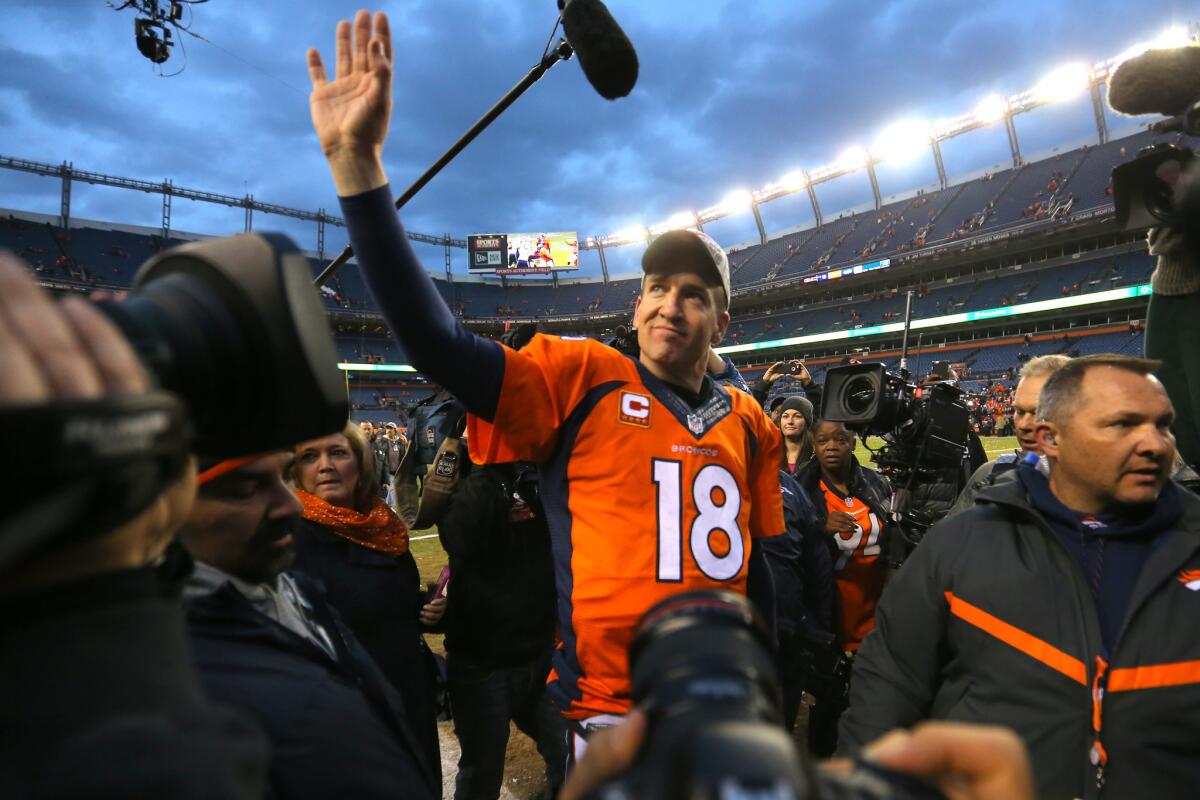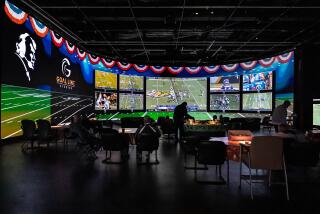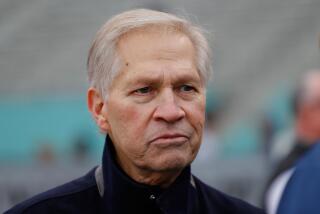Column: It’s the final roundup for Peyton Manning, who decides to retire after leading Broncos to Super Bowl title

Denver Broncos quarterback Peyton Manning walks off the field after a win over the New England Patriots on Jan. 24.
Reporting from Denver — Peyton Manning came prepared. He walked into a meeting room at the 1998 scouting combine, sat with a group of Indianapolis Colts coaches, and produced a yellow legal pad.
The Colts wanted to interview him, to make sure he was worthy of the No. 1 pick in the draft. But it was Manning who wound up running the show.
“We asked the first question, he then conducted the interview of us,” Bruce Arians, then the team’s quarterbacks coach, recalled by phone Sunday. “When he walked out it was like, ‘Did we interview him, or did he interview us?’ The classic question was, ‘What are the tax laws in Indiana?’ We were like, `Shoot, we don’t know.’ That interview was one of a kind.”
And so was Manning, who announced his retirement Sunday morning through the Denver Broncos, a month after helping lead that franchise to a Super Bowl victory. The NFL’s only five-time most valuable player, who turns 40 this month, finishes his career as the league’s all-time leader in career touchdown passes (539) and yards passing (71,940) for regular-season games. He also won a record 200 games as a starter, counting playoffs, and is the only quarterback to lead two different franchises to Super Bowl victories.
The Broncos have scheduled a news conference for 10 a.m. Monday at which Manning will formally announce his decision to retire.
A stickler for intense preparation, Manning sent individual text messages to his teammates Saturday, informing them of his decision, and reached out to his former coaches — among them Arians, now head coach of the Arizona Cardinals — to break the news in phone conversations.
“It was a blessing to coach Peyton Manning,” said Broncos Coach Gary Kubiak, whose team is coming off a commanding defensive performance in a 24-10 victory over Carolina in Super Bowl 50. “Nobody worked harder at the game, and nobody prepared harder than Peyton. His preparation was the best I’ve ever seen with how he went about his business. There was nothing like his work habits. Each and every week, he did everything he could to get ready to play, not only against the defense but against the coordinator.”
In his four seasons with the Broncos, Manning led the team to 50 wins, counting playoffs, and was the first quarterback in club history to be part of four consecutive AFC West titles.
Manning spent his first 14 seasons with Indianapolis, sitting out the last of those with a career-threatening neck injury that required four surgeries, then launched the second chapter of his career in Denver.
John Fox was the Broncos’ coach for the first three of those seasons, and got a two-word text from Manning on Saturday night that read, “You free?”
“He just wanted to let the guys who coached him to know first, which says a lot about him, in my opinion,” said Fox, now coach of the Chicago Bears. “We joked about him still trying to get ahold of Tom Moore [the 77-year-old former Colts offensive coordinator] and how he probably still had a flip phone with no voice mail. He talked to Jim Mora and Tony [Dungy].
“I really didn’t know what he was going to say. We talk all the time, so I didn’t know what it was about. We talked about 20 minutes. I congratulated him. I knew he’d take the right amount of time, and it wasn’t just an off-the-cuff decision. There was plenty of speculation; it was almost comical. I knew nobody knew what he was going to do, because he didn’t know.”
Said Mora, Manning’s first head coach in Indianapolis and the father of UCLA Coach Jim Mora: “When his name popped up on my cellphone I had an idea of why he was calling. I had an idea he was retiring, but it wouldn’t have surprised me a lot had he not. He’s such a competitor and he loves to play. It’s the end of a really big chapter.
“The mark he leaves is class. Total class. Humility. Humbleness. Winning was so important to him, and doing what it takes to win. Everybody says they know what it takes to win; he did it.”
In two speeches last week, one in Jacksonville and another in Las Vegas, Manning reportedly sounded as if he wanted to keep playing. He referred to his career in the present tense.
“My vision is to compete against the very best at the highest level,” he said Friday as part of his keynote speech for the Healthcare Information and Management Systems Society’s 2016 conference in Las Vegas.
Few people, if anyone, were under the illusion the Broncos would keep him and pay him $19 million for his 19th season. The team will pour its efforts into re-signing Brock Osweiler, who backed him up the past four seasons. But there was speculation another franchise might make a run at Manning, possibly the quarterback-needy Rams, who if nothing else could have further ramped up the anticipation of their return to Los Angeles this season.
In the final analysis, though, it was clear that Manning’s storied career was at an end. He struggled through one of his most trying seasons, when a foot injury (and shaky play) led to his missing seven of the final eight regular-season games. For the first time in his career, he was a backup, and that coincided with the rise of the 6-foot-7 Osweiler, who was both more mobile and had a better arm than his graying counterpart.
Manning came off the sideline in the regular-season finale to lead Denver to a pivotal victory over San Diego, one that secured for the Broncos the No. 1 seed and home-field advantage in the AFC playoffs, then started in postseason victories over Pittsburgh and New England to get to the Super Bowl.
Denver’s defense carried the day in the win over the Panthers, shutting down MVP quarterback Cam Newton and the top-ranked Carolina offense. There was a measure of synchronicity to that for Manning, who for years carried teams with his offense, especially in Indianapolis, where he won his first Super Bowl, at the end of the 2006 season.
“One of the most memorable moments where I’ve watched him was to accept the [Lombardi] Trophy last month, know that he carried the smallest amount of water that anyone has ever carried in the Super Bowl,” Hall of Fame quarterback Steve Young said. “But because he carried so much water for so long, he could actually appreciate the irony of it.
“Because when he carried all the water, what were his words? Team, team, team, team, team. You think, ‘Is that disingenuous?’ That’s why I thought it was so poignant that he could carry the trophy at both ends. There’s something really cool about what the game is, what football really is.”
So Manning will stand at the lectern Monday at Broncos headquarters, with his family in attendance, and take a step beyond his playing career. Plenty of opportunities await. If he wants to be an analyst, he’ll be the hottest commodity to hit the TV market in years. He could walk on to virtually any coaching staff, or work in any front office, should he so choose. Some people, among them John Madden, believe that for years he’s been positioning himself to one day become a team owner.
But the person who once walked into a job interview with a legal pad of questions of his own might not be entirely prepared for the emotions in front of him.
“When Peyton wakes up Tuesday morning, he’s going to talk about what he used to be great at,” Young said. “That’s a hard reality that we all face. As much as you love the idea of, ‘I won the Super Bowl and now I’m going to ride off into the distance,’ the pain of leaving is not necessarily any easier.
“But,” he added, “it definitely helps.”
Follow Sam Farmer on Twitter: @LATimesfarmer
More to Read
Go beyond the scoreboard
Get the latest on L.A.'s teams in the daily Sports Report newsletter.
You may occasionally receive promotional content from the Los Angeles Times.











